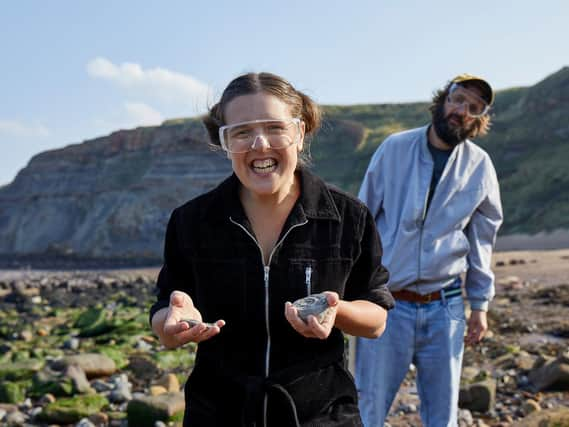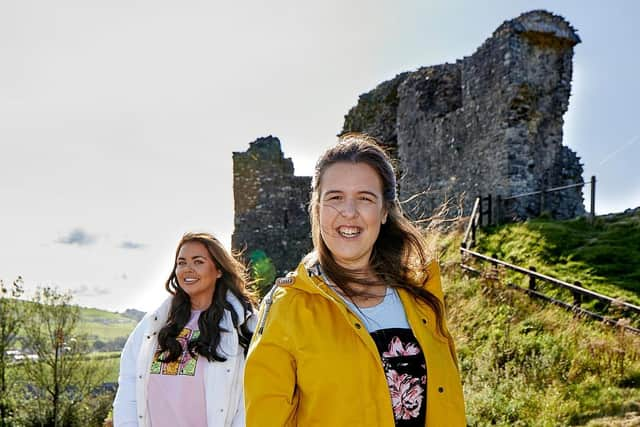Comedian Rosie Jones on the joys of British holidays and being a disability figurehead


“I don’t normally take bank holidays off but I had four days doing nothing and I didn’t realise how much I needed it,” she says cheerfully.
The past 12 months have been disastrous for many comedians who rely on live performances to make a living, but the work has kept coming in for the Bridlington-born comedian who has a children’s book due out this summer and whose new Channel 4 travel show starts this evening.
Advertisement
Hide AdAdvertisement
Hide AdThe show’s working title was A Great British, Female, Gay, Disabled, Covid Compliant Adventure, before later being changed to Trip Hazard: My Great British Adventure.


In the four-part series Rosie is joined by celebrity pals Scarlett Moffatt Joe Wilkinson, Jamali Maddix and Jenny Eclair and together they explore four different places, including Whitby, soaking up the glorious scenery and celebrating tourist landmarks and quirky local customs.
She kicks off her quirky journey when she takes TV presenter and personality Scarlett Moffatt to the Lake District where they try their hand at everything from Cumberland sausage-making to a Viking battle reenactment.
From the outset Trip Hazard, narrated with mischievous glee by Olivia Colman, playfully parodies the typical travel show format splicing Rosie’s jaunts with behind-the-scenes conflabs and guest cameos.
Advertisement
Hide AdAdvertisement
Hide AdThe show’s deliberate irreverence reflects Rosie’s own personality. “I don’t take things too seriously, so when we were making the travel show I didn’t want to be earnest. I wanted to do things that I would do if I was on holiday.”
It makes for warm, funny TV. “In Wales I went on a zip-line and I’ve never been pushed so far out of my comfort zone. But everywhere I went I met so many interesting people and each place brought its own joys and challenges.”
She filmed the whole series back to back which meant an intense couple of weeks. “I came back to London and I slept for about three days. But even though I was knackered I remember thinking ‘I think I’ve just had the best two weeks of my life.’”
It was particularly tiring for Rosie as she has ataxic cerebral palsy, which affects her speech and movement.
Advertisement
Hide AdAdvertisement
Hide AdThough she lives in London, when the pandemic struck she decided to return to her parents’ home in Bridlington, the town where she grew up. “I’m proud to be from Yorkshire and I love it, but I didn’t really enjoy growing up in Bridlington and I couldn’t wait to leave. But going back last year after a decade away I thought ‘actually it’s brilliant’.”
This sowed the seed for the TV series. “Right now a lot of the country is quite negative and we’re not very enthusiastic about how great Great Britain is, and on top of that the fact we can’t go abroad has made us a bit down about the country we live in. So I wanted to show people that Britain is actually beautiful and full of iconic scenery and has some of the best people in the world.”
Rosie says she grew up in a loving and funny family where everyone told jokes. But even though she would often be the one telling jokes on nights out with her friends, she says she never really entertained the idea of a career in comedy or being a stand-up.
“When I was a researcher I worked with comedians and figured out that they get paid a lot more money for a lot less work. I’m not a negative person and I have never been ‘woe is me’, but I thought the idea that I could be a comedian was off limits, because of my disabilities. Mainly because of how I speak. I thought nobody wants the world’s slowest comedian.”
Advertisement
Hide AdAdvertisement
Hide AdBut it was through working in TV production and seeing the need for greater diversity that she decided to take the plunge.
“I thought ‘well, why shouldn’t I be a comedian? I’ve always loved being the centre of attention and because of my disability I’ve always been confident in a crowd. People can be nervous around me so I need to be the one putting myself out there,” she says.
“It reached the point where I felt if I don’t try at least one comedy gig I’ll regret it for the rest of my life. So I did it and I fell in love with it and never looked back.” Having previously dismissed a career in comedy because people would get to her punchlines before she did, she’s turned her slow speaking to her advantage enabling her to subvert punchlines and take her audience by surprise.
“I’d like to think I’d be a comedian if I wasn’t disabled. But I am and it’s part of me,” she says.
Advertisement
Hide AdAdvertisement
Hide AdThough her comedy is cheeky and subversive, there is a serious side to her as she showed when she appeared on BBC’s Question Time last November when she took Health Secretary Matt Hancock to task, criticising the Government’s treatment of people with disabilities.
And she doesn’t sugarcoat the experience of having a disability when she was growing up.
“I had such an amazing childhood but I can’t get away from the fact that growing up with a disability in the 90s was hard because I never saw any disability, or anybody like me on telly, in sport or in the media. That has a negative effect on me and all disabled people, because you think ‘is my story not worth telling?’ But also it has a negative effect on able bodied people because they are not introduced to disability and so they see it as something they should be wary of and feel awkward about.”
Thankfully attitudes towards disability have changed markedly in the intervening years, even if there is still more work to be done.
Advertisement
Hide AdAdvertisement
Hide Ad“In my comedy I go out and say, ‘hello, I’m disabled, here’s some comedy about me and my disability,’ because disabled people should be represented. Saying all that I am not a politician and I am not a martyr. I’m very aware that I have a platform to raise disability issues, but at the same time I first and foremost want to be funny.
“So if I want to go on stage and talk about my slow voice, I will. But if I want to go on stage and talk about how bloody hard buying a house is, I can, because that is an experience I have as a 30 year old woman, regardless of whether I’m disabled, or gay, or a woman.”
Rosie admits that trying to be a public figure for people with disabilities and at the same time talk about everyday life, can be like walking a tightrope at times. “It’s complex but I’m a comedian so if I think there’s a great joke here about my disability I will take it.”
And as for her new travel series, she just hopes viewers enjoy it. “I wanted to make a show that was silly, positive and full of joy, and I think we’ve done that.”
She certainly has, and more.
Advertisement
Hide AdAdvertisement
Hide AdTrip Hazard: My Great British Adventure begins April 9 at 8.30pm on Channel 4. Also available as a box set on All 4.
Celebrating the best of British
From the glorious vistas of the Lake District to the seaside charms of Whitby, Rosie seeks excitement in the unlikeliest of places and meets enthusiastic locals who make each place feel warm and welcoming.
She throws herself headfirst into every situation, earning her stripes as a shepherd in Anglesey and even entering the ring under the glaring lights of a Saturday night wrestling match in Norwich.
In Whitby, she is joined by fellow comic Joe Wilkinson and together they enjoy a spot of crazy golf with a dramatic sea view.
They also explore the area’s famed Jurassic coast in search of fossils on the beach, head out on a fishing trip and, after a full gothic makeover, join a band on stage to scream until they’re hoarse.
Comment Guidelines
National World encourages reader discussion on our stories. User feedback, insights and back-and-forth exchanges add a rich layer of context to reporting. Please review our Community Guidelines before commenting.